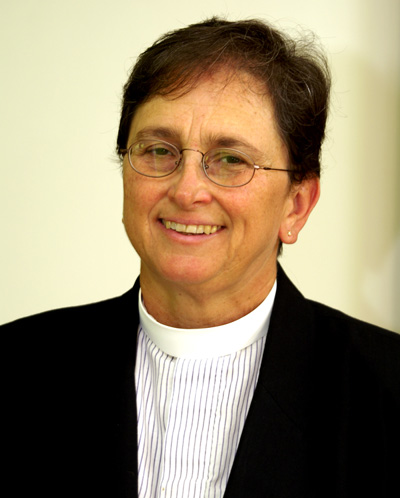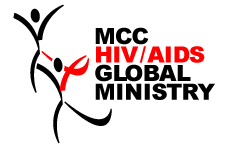by Rev. Nancy L. Wilson, MCC Moderator
First Sunday in Advent
Biblical Text: Mark 13:24-37
The 2008 hurricane season in Florida and the Gulf Coast was challenging and intense.
In some ways, a hurricane is not unlike a virus - it is opportunistic and arbitrary. How much damage it does depends on so many factors: how strong are the levees, how prepared is the community (can they evacuate safely and on time); how strong is the construction, how many resources have been employed in preparation and prevention of storm damage; how much degradation of the environment has occurred? Poverty exacerbates the damage and co-factors really matter, in both hurricanes and viruses.
In the worship and liturgical life of Metropolitan Community Churches, for better or worse, World AIDS Day is married to the first Sunday in Advent. Each year, Advent begins in darkness. In the Northern Hemisphere, the post-hurricane days themselves grow darker until just before Christmas; at the same time our Advent wreath grows brighter with hope, peace, joy and love.
So we begin - in the darkness with hope. The Christian calendar begins, in the lectionary readings, ominously, but also with hints of hope, hints of a brighter future where Christ returns and rescues a world gone mad.
Mark, the writer of the first gospel, called that first community of radical Christians to an uncommon hope in the midst of their first persecutions and sufferings - called them to be alert, awake, and watchful as God prepared to act. In some ways, for some of us, watching, keeping alert, and maintaining vigilance may seem too passive. But it implies so many things that are more active, as well.
This year, many of us in North America watched and waited with residents of New Orleans and the Gulf Coast as they anticipated storm after storm, Deadly Katrina was still fresh on their minds, and ours.
So we prepared.
We waited.
Then we acted.
And we responded.
In many ways, people now know the drill for hurricanes. They know to board up and to buy water and supplies. They know to sort through what they can take in their car or on a bus. This year, thoroughly chastened by Katrina, the U.S. government and nonprofit agencies seemed more prepared.
We, too, know the drill about AIDS.
We know so much more about HIV and AIDS now than we did 25 years ago. We know more about prevention. We know the co-factors: apathy, lack of self-esteem, homophobia, drug abuse, poverty, lack of access to health care, safe drinking water, lack of information and education, especially for women. We, too, are still storm-weary. We become overwhelmed by new statistics on the alarming rates of infection among young people, especially those who are homeless, women, people of color, young gay men. At times, our weariness has affected our vigilance. We see the storm clouds coming; we pray they will just pass us by. Sometimes we collude in the denial that envelopes our communities, our churches. We interpret the silence to mean that there is no storm on the way.
People in Louisiana worry that if they are overly prepared for a storm that does not come this time, they will be less likely to heed warnings the next time. Such is human nature. We have to constantly move against the complacency, the inertia, the passivity.
Jesus knew this, too. He shared our nature and knew how easy it is for us to revert to denial. He warns us to keep alert, to be prepared, spiritually, and in every way.
HIV and AIDS prevention is still a moral imperative for us. We must challenge every nation about its policies, as a matter of justice. We must challenge ourselves to vigilance around the message: we value your life, and the life of our community - prevention is possible! And for those already infected, life and longer life is possible! We are people of uncommon, sometimes even seemingly irrational, hope. Such is the nature of our faith.
Watching/Waiting:
Mark's Gospel insists that we stay vigilant and alert; that we stay tuned to the Weather Channel and CNN, as grueling as that can be. We must hear the calls for evacuation and we must heed them. I can still hear Mayor Ray Nagin on TV saying, "GET YOUR BUTTS OUT OF NEW ORLEANS!"
After weeks of storm warnings and flipping constantly to the Weather Channel, I got complacent. I was shocked when we had sudden, violent thunderstorms on my way from work one day - which turned out to be, the outer bands of Hurricane Ike, just barely touching us. I was just sure it wasn't coming our way - only to be surprised by how far it actually reached. The flooding on my way to the office the next morning was alarming; the rains were so heavy I nearly pulled over.
MCC, we must keep alert, we must keep awake, about HIV/AIDS. Another generation of young gay men is endangered, just as we have become so deeply aware of the generations we lost to AIDS years ago. The impact of that loss is still being felt in so many ways. New challenges and new losses are upon us, and sometimes we are asleep, we are not paying attention to the wider community that our church may not touch, who do not touch us, not yet.
We must keep alert to new trends and new information; we must understand the new co-factors that fuel infection rates in the US, in the North and West, and in the East and Global South. As a global community, MCC, how do we understand the connections between AIDS and Human Rights; between AIDS and emerging LGBT communities in places like Uganda and Pakistan and the Ukraine? Who are our allies and partners? How are we aware of the changing nature of the pandemic and what our spiritual/pastoral/justice responses must be?
Every MCC church must have that expertise, that AIDS alert button, embedded in our ministry.
Truthfully, for some of our churches, that expertise died or retired and we did not replace it. Today, who in your church does someone come out to about being newly diagnosed? Or about their struggles with medication and compliance? Or about coming out and HIV prevention? Some of us have to reconnect our congregations to what is really happening today in our communities, something our HIV/AIDS Ministry has been doing with excellence the last few years.
It is time for all of us to turn on the Weather Channel!
It's time to learn to read the Doppler ratings!
Acting:
In hurricanes, this often means evacuating, getting far enough away to stay safe. It means having safe places to evacuate to. With HIV/AIDS, it means facing what it takes to keep people safe and alive and filled with hope.
The people of the island nation of Haiti have no where to flee, no shelters, no buses. Their "levees" are broken. They have no protection, no barriers. The deforestation there means that mud slides unimpeded down the mountain. Poverty, racism, years of colonial rule followed by corrupt rule have made the people more vulnerable to hurricanes - and to HIV. Even the UN struggled to deliver emergency food and shelters while the storm was raging.
Most who are at risk for AIDS live in conditions like these. And for many of us, that is hard to comprehend.
This year, in New Orleans and the surrounding areas, unlike during Katrina, there was a lot of attention to evacuation. The elderly and those who were disabled, or vulnerable in some way, were evacuated first. Last time, they were largely forgotten - those in nursing homes or with mobility issues.
The greatest problem this year was people who did not go to shelters, but evacuated themselves, and then could not afford it, and were clamoring to come back early because they were sleeping in their cars and had no food.
Every time we go through this, we learn more about the potential impact.
I saw a touching account of how people acted who could not evacuate. There was a children's hospital that served children who were very ill, with cancer and life-threatening illnesses. Evacuation would have been very dangerous. They made sure they moved to the upper floors, had generators to last three or four weeks, and the entire staff - doctors, nurses, technicians, janitors - along with parents - moved into the hospital with the children, and they hunkered down together.
That is solidarity. It is the solidarity of Mother of Peace orphanage in Zimbabwe; it is the solidarity of MCC with those whose battle with AIDS is in those final stages, where we hunker down and hold vigil and keep faith with those, even today in 2008, who are dying.
Returning and Restoring:
Once the initial emergency subsides, there is the long, slow work of cleanup and repairing, restoring.
This is not the romantic phase of the work in hurricanes. This is the tedious work: removing flood water and debris; assessing damage; tossing out all that was ruined; tearing up and rebuilding walls and floors. Getting the power back on. Emptying the refrigerator and freezer. Scrubbing and painting. And scrubbing some more.
In HIV/AIDS work, it is the nitty-gritty of paying attention to public policies; attending to co-factors of drug use, poverty, access to medications and treatment; talking about things that make people uncomfortable; examining our own attitudes and prejudices. It is willingness to get better information and working with long-term survivors.
Today, I remember Paul from MCC Los Angeles. He died last year in a freak accident at the beach. Paul was a long time HIV/AIDS survivor when I first met him - but he was barely surviving. He was depressed, without friends or community, empty, aching, given to violent outbursts, feeling like a ghost who had outlived every friend. MCC Los Angeles gave him a new life. Starting one day a week, he eventually came to volunteer full-time: answering the phones, painting, playing piano and singing, helping with the young adults' group. He got on better meds, found a better place to live. He made friends, found a home, discovered a purpose, rediscovered God and Jesus and love. He rode in the AIDS Ride two years in a row. He made a difference. And he died in the midst of a full, second life, a happy and restored man.
There are so many like him who need us.
And we need them.
We must learn about the world of HIV/AIDS in 2008, not 1988. It's a world that includes young activists in Uganda, arrested for protesting their government's refusal to fund any prevention of HIV/AIDS in sexual minority communities. In Uganda, silence still equals death and speaking up means imprisonment. This is true in many places in the world.
It means reaching out to young queer people in North America who may not think they belong in MCC, or in any church. We have to let them know that none of us belonged at first. And that we care about what they care about, that we care about their spirituality and their need for community, even if it seems different from ours. This we know: If they are queer or unusual or uncommon, Jesus would welcome them, would get to know them, would touch them with hope and love.
Today, we must do no less.
Wake up, MCC! It is 2008, and HIV/AIDS is still raging, raging like a hurricane that seems to dissipate, only to again gather strength over a warm Gulf.
There may be a day when we do no longer need a World AIDS Day; we pray and long for such a day.
But that day is not December 1, 2008.
We still need this day - this day of watching and waiting, this day of preparing and acting, this day of returning and restoring.
And all of us who, one way or another are living with HIV/AIDS, need this community of faith, and hope, and love.
Amen.
(END)











No comments:
Post a Comment